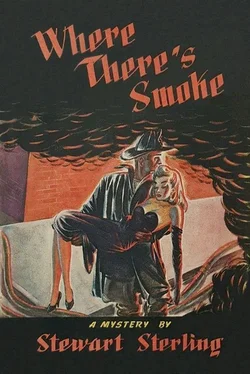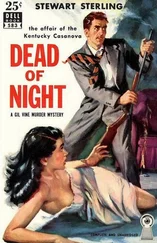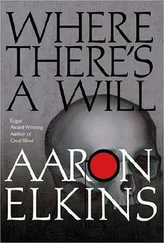“I know quite a bit about him, Fred. He’s an amateur, improvises as he goes along. He’s well-fixed with dough, because when he had the chance he wouldn’t touch a roll that would choke a hippo. He’s in or close to show business.” Pedley started down to the street. “Also, he cuts a lot of ice around City Hall.”
He left the deputy chief puzzled, shaking his head. Down on the street, he spoke to a police surgeon working over a fireman on the sidewalk.
“Broke his hip,” explained the doctor. “Slipped on the stairs.”
“Any other casualties?”
“Couple smoke-chokers. You look as if you could stand a little jelly on that ear, yourself, Marshal.”
“I’ll let ’em treat it at Saint Vincent’s.” He put the remnant of the candy box in a white-enameled photographer’s tray, tied the lid on, stuck it on the ledge back of the seat in his sedan.
At the hospital he parked by the EMERGENCY platform, went along a corridor smelling of ether and antiseptic. The night matron led him to a corner of the women’s ward.
“She hasn’t been conscious a second. They keep her going with adrenaline.”
“I know. She hasn’t a prayer.” He stood at the cotside, watching the doctors work over her.
Where the bandages didn’t hide it, Kim’s face was putty-gray. Her lips were gray; there was a metallic sheen around her mouth and nose.
One of the medical men spoke without looking up. “Only a question of time.”
“Yair. Has she talked?”
“Mumbled a little. Delirium, of course. Nothing the nurse could take down.” The doctor nodded toward a probationer standing by the condition chart with a notebook.
“I’m going to phone. Be in the booth, down the hall. Call me if you see any chance of an in extremis.”
He rang his office. “You don’t have to dig up anymore dope on the Wasson kid, Barney. She’s through.”
“Holy cats! The Horatio Street blaze?”
“That’s right. Same bug who sparked the theater. Same technique.”
“Son of a bitch!”
“He got her because she’d been talking to me.”
“Speaking of which, boss, Shaner’s been calling in every ten minutes to get hold of you.”
“What’s his complaint?”
“The Lownes babe. She got away from Maginn.”
Pedley swore with conciseness; added, “Where is she now?”
“Well, she’s back at the Riveredge, boss. But Mag lost track of her for a while and it took Shaner a little time to retrail her.”
“Where’d she go?”
“Took a hack to Twenty-third and Madison, then switched to another that let her out at Christopher and Seventh.”
The matron tapped on the glass of the booth door. “She’s going—”
“Said anything?”
“Tryin’ to—”
Kim’s eyes were still closed, but her swollen lips moved torturedly.
The probationer whispered, “While you were out, she said ‘Three minutes—’ and something about a curtain. I couldn’t catch it.”
“Three minutes to curtain time,” Pedley said. “She’s not calling it far wrong.” He bent over.
Kim’s slack lips twitched. “…ill.”
He could just make it out the second time. “… Bill.” Then the thin lips were still.
The doctor sighed. “Did all we could for her, Marshal.”
“Not quite. Not yet.”
The physician frowned uncertainly.
Pedley motioned. “See you a minute?”
He and the medical man went out in the hall for a brief consultation. The doctor began by shaking his head; ended by nodding dubiously.
“I can’t guarantee anything, Marshal. But I’ll do what I can.”
“That’ll be enough.”
“How about yourself? You look as if you ought to pile up in one of our private wards.”
“If you feel like putting some tannic salve on this ear, I won’t say no.”
While the jelly was being applied, the doctor made one more attempt. “What you really need is about fourteen hours of good, sound sleep.”
“The raveled sleeve could stand a little knitting. Tell you — a couple of Benzedrine might pick me up. How about such?”
He took his own medicine in a quart of the blackest coffee the Sheridan Square Wagon could serve up, scanned the morning papers while he ate.
There was plenty about the theater fire. None of it was new, except some slants on Ned Lownes:
One of Broadway’s most popular citizens… Greatest eccentric dancer of his time… Leading theatrical manager…
Pedley detected the fine hand of Terence Ross in the phrasings.
And there was one line that made the marshal smile wryly over his coffee cup:
Miss Lownes, the incomparable Leila of stage, screen, and radio, is prostrated at her East River residence over the untimely death of her brother.
He wondered how she’d feel about Kim Wasson.
There hadn’t been any brotherly love lost between Leila and her brother. But Kim had been close to the singer, had been a friend of Bill’s.
Conover had been pretty cheerful about Ned’s passing. What happened to the Wasson girl might affect him differently. Still, the lieutenant had seen a lot of killing, close up, and not so long ago — maybe death didn’t disturb him very much.
In that case, it might be a good idea to take precautions. But quick—
Chapter Sixteen
Very Natural, Very Dumb
The snow was falling faster at Sheepshead Bay, and it was deeper. The wind sliced in off the Channel like a ripsaw. False dawn was just beginning to gray the east. It was bitter cold.
The rows of canvas-shrouded hulls on the ways were piled yard-high with sugar-frosting. A few wore no winter covers, but it was hard to distinguish them from the others. Only a few had a sheathing of thin boards; of these but two were reasonably free of the caked covering.
One bore the name Judy C. in heavy letters across her transom. The marshal passed her up; Conover might not be the kind of waterman who insisted on naming his craft after his girl, but he’d hardly own a boat bearing the name of another.
Smoke plumed up from the Charley Noble of the second choice, anyway. Now that he plowed nearer along the hard-packed path through the shipyard, Pedley saw that the portholes of the Voyageur emitted faint light. There was someone aboard.
The someone was singing. Pedley didn’t recognize the tune or the language — probably something the lieutenant had picked up over in the Islands. There was no mistaking the voice.
Against the starboard side of the 38-footer stood a short, homemade ladder. Pedley went up it quietly, pushed aside the canvas windbreak which served as vestibule door, stepped softly onto the deck.
The deckhouse was empty and dark. What illumination there was came from the forward companionway. Pedley made no noise opening the deckhouse door — or closing it. The draft an open door could make in weather like this would be fairly noticeable.
The smell of bacon came up the companionway, along with the liquid melody of the South Seas.
Pedley went below.
Conover didn’t hear him. He stood with his back to the companionway, forking strips of golden brown onto a plate.
“Morning, Lieutenant.”
The younger man dropped fork and frying pan, whirled on the balls of his feet, ducked into a semicrouch, reached for the back of his neck, recognized the marshal, froze.
“Used to a collar sheath?” Pedley came down to the galley, leaned against the door to the motor compartment. “Got a knife cached back there? Or was that just habit? Takes a while to forget a routine that’s been hammered into you. Took me five years to forget I didn’t have to jump down a brass pole every time I heard a gong ring somewhere.”
Conover straightened up, brought his hand away from the neckband of his sweater.
Читать дальше











